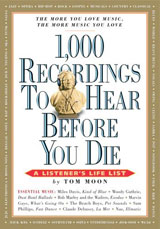
Too many holes to be useful
|
This review first appeared in the October 12, 2008 issue of the North County Times.
Any music guide is going to be, by its very definition, subjective. It's the nature of the beast.
So to criticize a book like Tom Moon's new guide by arguing that this record shouldn't be here when this other one isn't is pretty petty – and if that argument were to be adhered to, we'd simply not have any music-buying guides.
But if one claims to be offering a basic guide to the best recordings in history, to be creating, as the book's cover itself says, "A Listener's Life List," then there ought to be some sort of adherence to offering at least a foundation of what are generally considered to be the most influential and best recordings.
And on that score, Moon's book comes awfully close to failing.
While the majority of albums on his list are worthy, and he shows an admirable willingness to list lesser-known albums that are wonderful listens, a series of blind spots in his selections are so egregious and so utterly misrepresent the history of 20th century music, that ultimately they leave this a deeply flawed book.
The worst is the utter absence of the New Orleans jazz renaissance of the 1980s through the present. Moon lists not a single album by the Marsalis clan: nothing from Wynton, nothing from Branford, nothing from Delfeayo or patriarch Ellis. Even if one doesn't particularly care for Wynton (which Moon clearly does not, offering several withering comments about him in other jazz entries), the man has been the most influential jazz musician of the last quarter-century. And, oh yeah, he's the only jazz composer to ever win the Pulitzer Prize for music. Besides, the Marsalises aren't the only folks who have helped restore New Orleans to a place of prominence in American music. But you won't find Harry Connick Jr. here, either. Nor Terence Blanchard, Leroy Jones or Nicholas Payton.
The re-emergence of New Orleans as a major jazz center has been one of the most important developments of the past few decades, and yet there is nothing here to help listeners explore that. It is a truly curious oversight.
And while this book is presented as a guide to worldwide music, the French selections are too thin to be truly representative of that nation's contributions. Yes, the obvious Edith Piaf is here – but where's Charles Aznavour? Charles Trenet? Henri Salvador? Did France truly produce only one great singer?
Finally, San Diego music fans might wonder about the complete absence of any bands from San Diego County. There is nothing from The Cascades, San Diego's first band to score a charted hit. No blink-182. No Charles McPherson or Jeannie and Jimmy Cheatham or P.O.D. or Switchfoot or Jewel or Jason Mraz or Stephen Bishop or Beat Farmers or Iron Butterfly. Nada. One of the most vibrant music hubs in the country, and not a single mention.
Moon was music critic for the Philadelphia Inquirer for 20 years, and he knows a lot about music.
But this book is being marketed as an essential guide to music you shouldn't miss during this life – yet using this guide will cause you to miss far too much of the most influential music in history to be able to trust it.
